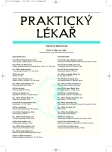Individual treatment of germ cell tumours including autologous stem cell transplantation
Individuální postup v léčbě germinálních nádorů včetně autologní transplantace krvetvorných buněk
Léčba germinálních nádorů se řídí standardními doporučenými léčebnými postupy (European Association of Urology Guidlines 2007). Přínos vysokodávkované chemoterapie s následnou autologní transplantací krvetvorných buněk zůstává obtížně hodnotitelný. Indikační opodstatnění má pouze v rámci protokolů klinických studií. Na onkologickém oddělení FTNsP se od září 1997 do května 2007 léčilo tímto způsobem 56 nemocných (protokol CARBOPEC). V záchranné léčbě 2. linie chemoterapie se léčilo 32 nemocných s relabujícím nebo refrakterním germinálním nádorem a v primární léčbě v 1. linii se léčilo 24 nemocných s nepříznivou prognózou. Pacienti s perzistencí, progresí nebo relapsem onemocnění pokračovali v další terapii. Sledované období po transplantaci (k září 2007) je 4 až 113 měsíců. V současné době žije 42 nemocných (75 %), zemřelo 14 nemocných (25 %). Medián doby do progrese onemocnění (TTP) všech nemocných je 7 měsíců, medián doby celkového přežití (OS) 52 měsíců. Medián přežití bez známek nemoci (DFS) je 54 měsíců (32 %) a medián doby přežití bez známek progrese (PFS) s a bez terapie po transplantaci je 52 měsíců (58 %). Individuální postup v léčbě germinálních nádorů včetně autologní transplantace krvetvorných buněk přináší léčebný prospěch.
Klíčová slova:
autologní transplantace, periferní krvetvorné buňky, vysokodávkovaná chemoterapie, potransplantační terapie, germinální nádory, záchranná chemoterapie
Authors:
J. Nepomucká; J. Abrahámová; M. Foldyna; Kordíkovád.; Donátováz. 1; Pagáčovál. 1; I. Stříž 2; M. Greplová; M. Bártová
Authors‘ workplace:
Onkologické oddělení Fakultní Thomayerovy nemocnice, Praha
Přednosta: Prof. MUDr. Jitka Abrahámova, DrSc.
; Pracoviště laboratorních metod Institutu klinické a experimentální medicíny, Praha.
Přednosta: Prof. MUDr. Antonín Jabor, CSc.
1; Transfuzní stanice Fakultní nemocnice Královské Vinohrady, Praha
Přednosta: MUDr. Jitka Kracíková
2
Published in:
Prakt. Lék. 2007; 87(12): 716-719
Category:
Of different specialties
Overview
The treatment of germ cell tumours follows standard recommended treatment guidelines (European Association of Urology Guidelines 2007). The contribution of high-dose chemotherapy with autologous stem cell transplantation is still controversial and autologous stem cell rescue is only indicated in clinical trials. Autologous stem cell rescue was provided at the oncology department of Thomayer Teaching Hospital from September 1997 to May 2007 to 56 patients; as salvage chemotherapy to 32 patients with relapsed or refractory germ-cell tumours, and to 24 patients with adverse prognosis as primary first line treatment. The high-dose conditioning CARBOPEC protocol was used. The patients with persistence, relapse or progression of the disease had additional treatment. In the follow–up period ranging from 4 to 113 months (to September 2007), at present 42 (75 %) patients are alive and 14 (25 %) pts have died. Median time to progression (TTP) of all patients is 7 months, median overall survival (OS) is 52 months. Median disease free survival is (DFS) is 54 months (32 %) and median progression free survival (PFS), with or without additional treatment, of the surviving patients is 52 months (58 %). High-dose chemotherapy as upfront treatment for germ cell tumours with poor prognosis, and as salvage treatment in high risk tumours, seems to offer a good possibility of individual treatment.
Key words:
autologous transplantation, peripheral haematopoietic stem cells, high dose chemotherapy, germ cell tumours, salvage treatment, upfront treatment, additional treatment
Labels
General practitioner for children and adolescents General practitioner for adultsArticle was published in
General Practitioner

2007 Issue 12
- Advances in the Treatment of Myasthenia Gravis on the Horizon
- Memantine in Dementia Therapy – Current Findings and Possible Future Applications
- Memantine Eases Daily Life for Patients and Caregivers
- Possibilities of Using Metamizole in the Treatment of Acute Primary Headaches
- Metamizole at a Glance and in Practice – Effective Non-Opioid Analgesic for All Ages
-
All articles in this issue
- Laparoscopic cholecystectomy for cholecystolithiasis and its complications. Retrospective 1-year analysis of 411 patients
- Intestinal tapeworms. Do they still exist? Are they still able to surprise us?
- Is advanced breast carcinoma a contraindication for reconstructive surgery?
- Typical and atypical forms of Celiac disease in adults
- Diagnostic and treatment of perilunate dislocations
- Functional systems of the human brain
- Sleep disorders in general practice
- Patient satisfaction with erectile dysfunction treatment: Viagra vs. dietary supplements
- Individual treatment of germ cell tumours including autologous stem cell transplantation
- Periurethral implants (injectables) – a neglected treatment option?
- Influence of frequent upper respiratory infections on the occurrence of thyroid gland diseases – a comparison with general population
- Motivation to smoking cessation in a sample of smokers measured by transtheoretic model: a pilot study
- General Practitioner
- Journal archive
- Current issue
- About the journal
Most read in this issue
- Functional systems of the human brain
- Laparoscopic cholecystectomy for cholecystolithiasis and its complications. Retrospective 1-year analysis of 411 patients
- Intestinal tapeworms. Do they still exist? Are they still able to surprise us?
- Typical and atypical forms of Celiac disease in adults
